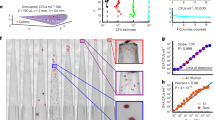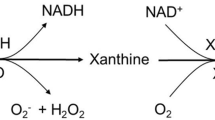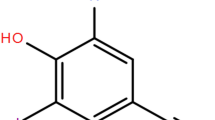Abstract
RESAZURIN was discovered by Weselsky1, and first used by Pesch and Simmert in 19292 for estimating the bacterial content of milk. It has lately been extensively used in Great Britain as a basis for a number of tests for the hygienic quality of milk3,4. Reduction takes place in two stages
This is a preview of subscription content, access via your institution
Access options
Subscribe to this journal
Receive 51 print issues and online access
$199.00 per year
only $3.90 per issue
Buy this article
- Purchase on Springer Link
- Instant access to full article PDF
Prices may be subject to local taxes which are calculated during checkout
Similar content being viewed by others
References
Weselsky, Berichte, 4 32, 613 (1871).
Pesch, K. L., and Simmert, U., Milchw. Forsch., 8, 551 (1929).
Baker, W., et al., Biochem. J., 36, 1/2, i (1942).
Davis, J. G., Food Manufacture, 17 308, 344 (1942).
Clark, W. M., U.S. Pub. Health Rep. (Reprint No. 826).
Author information
Authors and Affiliations
Rights and permissions
About this article
Cite this article
TWIGG, R. Oxidation-Reduction Aspects of Resazurin. Nature 155, 401–402 (1945). https://doi.org/10.1038/155401a0
Issue Date:
DOI: https://doi.org/10.1038/155401a0
This article is cited by
-
Encapsulation within a coordination cage modulates the reactivity of redox-active dyes
Communications Chemistry (2022)
-
Understanding the induction time associated with the photoredution of resazurin by hydroxylamine in the presence of gold nanoparticles as a photocatalyst
Reaction Kinetics, Mechanisms and Catalysis (2020)
-
Anaerobiosis revisited: growth of Saccharomyces cerevisiae under extremely low oxygen availability
Applied Microbiology and Biotechnology (2018)
-
A rapid and miniaturized system using Alamar blue to assess fungal spore viability: implications for biosecurity
European Journal of Plant Pathology (2017)
-
Evaluation of the effects of different liquid inoculant formulations on the survival and plant-growth-promoting efficiency of Rhodopseudomonas palustris strain PS3
Applied Microbiology and Biotechnology (2016)
Comments
By submitting a comment you agree to abide by our Terms and Community Guidelines. If you find something abusive or that does not comply with our terms or guidelines please flag it as inappropriate.



